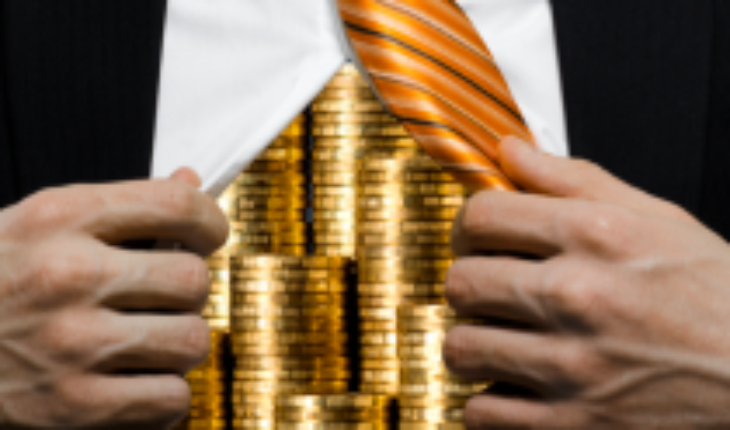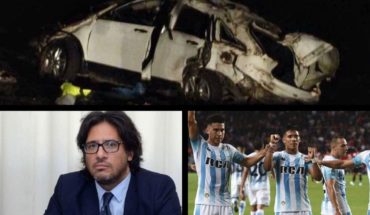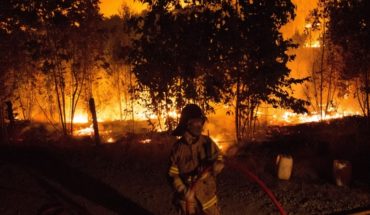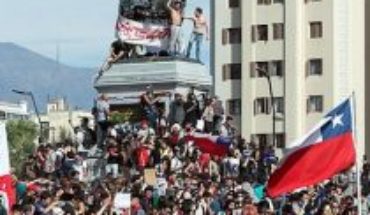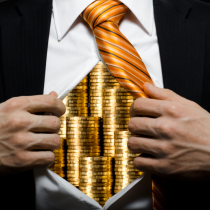
It was previously questioned by several cases of collusion and illegalities in policy financing, but it is since the social outburst of October last year that the country’s political, economic and business elite is under citizen scrutiny. Today, in the midst of the global pandemic of the coronavirus and its inevitable negative effects on the economy, it is not yet clear what role it intends to play in this complex scenario: to use its powerful backs to sustain the rest of the country or to watch over, once again, only for its privileges, disconnected from reality and prioritizing the argument already known : that the economy cannot stop.
That is why doubts have arisen as to whether there is pressure from large economic groups to resume activities, even if it means putting thousands of workers at risk. In Easter the public discussion was hilarious, it seemed taken from one of those Central American teleseries where it boasts luxury, with helicopters, tycoons and exclusive spas. But it was not a bad novel script, but what happened in the midst of a health crisis, when some representatives of that questioned elite chose to skip quarantines and sanitary cords to enjoy a few days in front of the sea.
The mayor of the Metropolitan Region, Felipe Guevara, said he received reports of helicopters that had left Santiago for Zapallar and the mayor of Santiago, Felipe Alesandri, christened them “heaped with propeller”, while the former company of Celfin Capital (now BTG), Jorge Errázuriz – who has also had political history with Ciudadanos – fought them cheaply and virtually , José Manuel Urenda (head of the shipping clan), having arrived by helicopter to the coast, insisted that his neighbor’s helicopter was not parked there and brought up the option of quarantine in second home, taking into consideration of legal indications.
Days later Urenda himself – son of former UDI driver Beltrán Urenda – acknowledged that he had gone to the beach, but insisted that he had committed no wrongdoing. Little did him, to overcome the wave of criticism, the fact that days before the helicopter episode he had appeared on the pages of the fifth region newspapers, expressing his intention to facilitate the VTP cruise terminal for a field hospital.
He wasn’t the only one. He also circulated the name Cristóbal Kaufmann as another entrepreneur who opted for air transport to bypass the sanitary cord. He appeared in full color yesterday in The Third PM, posing next to the helicopter and claiming – in a tone with a justified smell – that these days “mearing an entrepreneur is a normal thing on social media”.
But helicopters weren’t the real scandal inside the elite. There was one that went unnoticed between COVID-19 contagion figures and quarantines. After almost a decade, the Supreme Court sanctioned supermarkets for colluding to raise the price of chicken meat, the most consumed in the country: the fine exceeded by 120% what was already sentenced by the Free Competition Court (TDLC).
In the face of this sanction, business circles spoke of the “antiquity” of crime, which many practices in its time were considered reasonable or lightly justified, but that today there is much more clarity about the relevance of free competition to the smooth functioning of the economy. “There is no longer room or acceptance for bully practices such as tissue collusion, in which the dominant imposes its conditions on the incoming or small competitor. For decades there was a comment on the arrogance of some great ones and how they manipulated markets with their power. There’s almost no room for that today,” said one company manager.
Despite this new business logic, there was still no substantive manifestation of the Sophoke or CPC about the episode. But there was time and dissemination for the largest private fundraiser ever recorded and starred the new leader of entrepreneurs, Juan Sutil: more than 80 billion to contribute to the health crisis, to be used – among other purposes – to acquire mechanical fans and essential inputs, such as masks. This business effort has involved coordination with the Ministry of Health for the delivery of resources and support for scientific research in the fight against coronavirus.
The Luksic family quickly moved their threads and made available a million masks to support the emergency. With no logistical problems or major restrictions, he imported them from China, where the Luksic seem to have more contacts than the government itself. Not for nothing, Andronicus has always been a stable cast of official delegations to the Asian giant.
Two sides of the mirror
This business-sector benefactor performance has another side, other “ingredients” to consider. There is the early request for assistance to the Government by Latam – a company of which President Sebastián Piñera was a partner, maintaining a close friendship with their current controllers, the Cueto family – and that entrepreneurs such as Horst Paulmann or the Calderón family have already announced to their workers that their respective chain stores, Paris and Ripley , would be eligible for the Employment Protection Act to overcome economic losses arising from the pandemic.
THE economist and academic of the FEN, Escar Landerretche, said that in these crises a maelstrom of statements is generated, that many of them are “buenismos” that speak of more generosity on the part of the power groups, but that the point is that they are not just words of good upbringing: “The elite has to decide whether to bet on the viability of the country.” He put the spotlight on the most important point still to determine how power groups, entrepreneurs, and their ability to tip the balance towards rational control of the crisis and not one towards unrestricted defense of the model, will behave, because “it will be written on the books and they will be judged for it.”
The analyst and academic of the Faculty of Government of the Central University, Marco Moreno, argued that the Government is at the crossroads of controlling the health emergency and allowing a reasonable performance of the economy, in circumstances that – in his opinion – the business elites are not so willing to give up what they consider their legitimate profits. “They understand that these times of crisis are an opportunity to set up their own agendas, demands and interests. The Government is on short range, because it has in some way defended these interests. What we have seen in the latest actions of business elites is what some call ‘disaster capitalism’, which expresses how big companies see in the crisis an opportunity to profit directly,” he said.
For Moreno, economic and business elites are moving under this profit-maximizing logic. It is what Naomi Klein aptly calls the “doctrine of shock,” which ends up enriching only elites and deepening inequalities.
Axel Kaiser, of the Foundation for Progress – the think tank of the entrepreneur Nicolás Ibáñez – analyzed the topic in a column in the Financial Journal. “What can be said, in light of all this, about the scandal of those who traveled by helicopter to Zapallar? The first thing that is obvious is that it was a decriterion that speaks ill of the civic commitment and intelligence of those few who, in violation of the law, made the journey. The second thing is that there is a gigantic hypocrisy of those who attacked them so poisonously, because obviously there are thousands of Chileans without a helicopter or house in Zapallar who have violated quarantines, exposing even more people to the virus. But nobody cares about that. Because we live in an environment that has long been carrying out with social hatred, the decriterian helicopter owners became another symbol for the attacks of resentment on an entire class. The problem here, then, is not only the stupidity committed by the subjects in question, but its social status and the anger that generates in many its braiding in that context.”
He added in his column a question that he himself answered in a row: “Are there many people in Chile who would not want to have a helicopter and a house in Zapallar? The promise of socialism was always that the capitalist standard of living would have it all – they will squirt the springs of collective wealth, Marx promised – but we know that this was a pretext to make revolution and reserve those luxuries, now yes, for a tiny new elite. This new elite, unlike capitalists, did not get them for their skills to create value for others, but to kill their opponents and use the useful fools who believed their story, as the novel Rebellion on the Farm, in Orwell, is well reflected.”
Kaiser ended with today’s obligation for the elite to set an example and that on their clear civic commitment depends on the destiny of a nation, not only on their ability to create wealth: “If those who occupy the top of the social pyramid behave like new rich simplistics, unable to understand the world in which they live, then they not only deserve a recrimination for not being at the moral height of their position but they feed, themselves, the monster they fear most: revolution.”
“Killing” the economy
In Quilpué people made long lines to enter the only mall in the country that opened its doors in the midst of a health crisis. They went to take money or the supermarket or see “what’s open,” all in the midst of the new mantra that the President installedand Piñera since this weekend: the “new normal”. The decision, which generated much criticism for the risk of contagion involved, was short-lived and yesterday afternoon it was announced that the mall was closing its doors again.
While the Government, with the hands of the Central Bank, has made efforts to try to keep economic activity alive, the debate has already been installed between experts and the private world about when the time is best and how it should be returned to “normal” levels of operation.
At the end of March, one of the first to raise their voices was Juan Sutil: “People are very light at times in saying ‘you have to apply total quarantine’, but if you paralyze this country, believe me that if we paralyzed it, we become perhaps the poorest country in Latin America again. It can’t be that.”
As the days went on, the discussion deepened. On April 7, LarrainVial’s partner, José Manuel Silva, had to undo in explanations then point out, in an interview with Pulso, that “just leaving, it’s ok, we assume that we managed to control the pandemic and we buy time for the vaccine to arrive, but we can’t keep stopping the economy and therefore we have to take risks, and those risks mean that people are going to die.”
What Silva meant was in line with the debate raised by Martin Wolff, of how the economic recovery would be resumed and what costs it would have, but his words reaffirmed that widespread feeling in part of the population, that the entrepreneurs are going to save them and their companies, to every event.
The general manager of the Santiago Chamber of Commerce (CCS), Carlos Soublette – in an interview with Emol – was explained about how the activity can resume, under what criteria and instructions, and concluded that “we have to be able to see if we will be able to function in the coming months and perhaps years (…). In that context, we cannot kill all economic activity for saving lives, because then we will be lamenting that people starve to death. It is very complex and I know that no one is going to say otherwise: you have to put health in front of the economy, but the economy also brings health and a destroyed economy is also going to bring very deep health problems.” He should also have gone out later to clarify his sayings.
In the face of these episodes, analyst Marco Moreno was categorical in his analysis: “The pro-solidarity and pro-aid posture to mitigate the health crisis and its correlation in deaths is ultimately a communication strategy to benefit directly from the crisis. The economy is a means of tackling the crisis and not an end in itself. The debate between economics and health is not ethically suited. Doing so is more equivalent to a blackmail typical of the ‘doctrine of shock'”.

